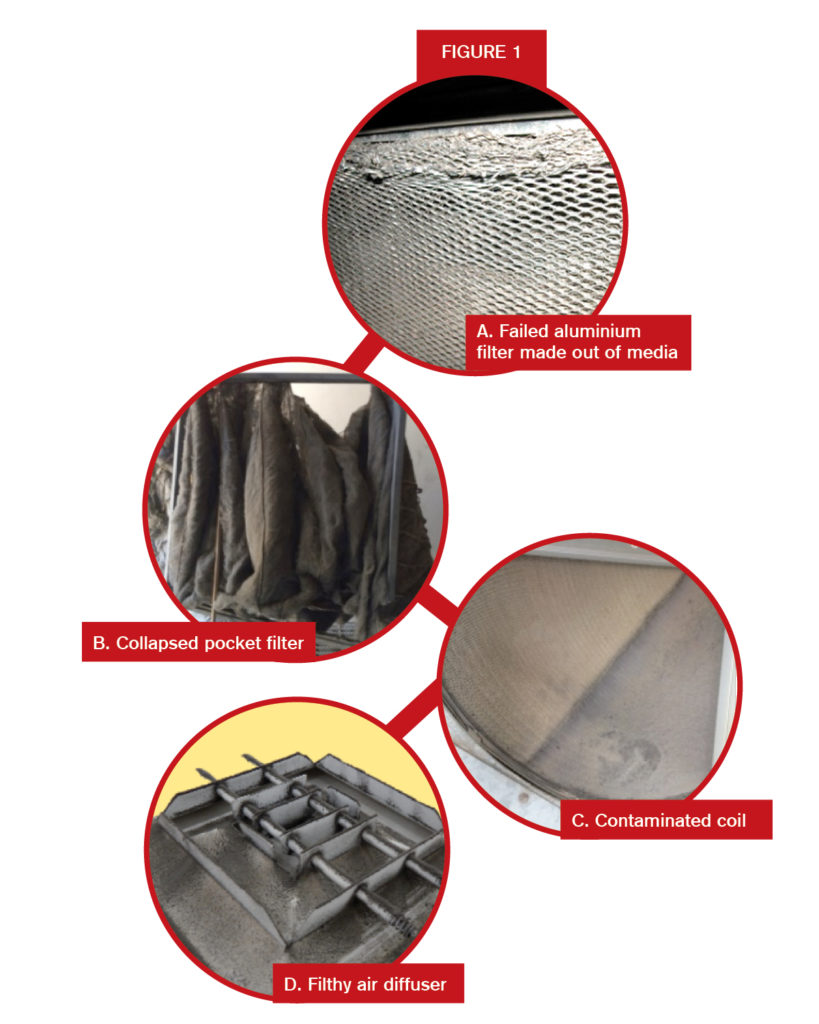For years, we have been dismissive of adopting proper IAQ measures, argues Dr Iyad Al-Attar, and, at best, have treated them as afterthought…
and the perils are visiting us now– and how?
A vicious virus has invaded over a million respiratory systems and, broadly, visited misery upon humankind. The Severe Acute Respiratory Syndrome Coronavirus 2 (SARS- CoV-2) cataclysm, which reportedly ignited in December 2019, has hijacked our peace and societal interaction, debilitated entire nations and threatened to push the world into a seemingly irrecoverable recession.
We had assumed that the past 60 years of progress in diagnostics, vaccines and supercomputing, and in analytical tools, such as genomics, bioinformatics and scanning electron microscopy would render our preparedness intact. To our surprise, accelerating globalisation, industrialisation, rapid urbanisation and population growth have increased the health security risks and made us more vulnerable, particularly among the immune- compromised patients, newborns, the elderly and the less equipped.
THE OVERWHELMED HEALTHCARE SYSTEMS
In the past few years, the world has been entangled in open-ended wars that have left millions of refugees displaced. These conflicts have exhausted the health infrastructure and induced difficulties to access populations that are less equipped or prepared. While regulatory frameworks of well-developed countries require refinement and innovative thinking to fit emerging realities of recent pandemics, we need to extend a helping hand to countries who are yet to create ones. Today, healthcare systems are increasingly overwhelmed by quarantine measures, as countriesare experiencing crippling disruptions of trade and transportation.
Outbreaks that unfolded over the past two decades, such as SARS, H1N1, Ebola and Zika, have neither scared us
enough nor inspired us to undertake enough preparations. Startlingly, even after all these wake-up calls, the world has fallen far short of the
basic needs to confront a pandemic. We have focused on knowing the statistics about pandemics rather than knowing the truth and preparing the appropriate plan to encounter them. Evidently, the world’s responses to previous outbreaks have been exceedingly slow and, at times, extraordinarily
antiquated to the extent that unrest has broken out over face masks and food. With all the advanced technologies available at our fingertips, we are still exposed, vulnerable and now locked up.
OUR GLARING DEFICIENCIES
We continue to live in denial of the glaring deficiencies in the way we have been managing our indoor and outdoor environment. We regarded better air quality as
an extravagance and placed it on the backburner, until SARS-CoV-2 locked us in our homes and brought flights, work, schools, shopping malls and economies to a halt, and now threatens to push the world into recession or, worse, depression.
Air quality and the role of air filtration in cleaning the air have been overlooked; and today, we are facing the consequences. There has been no paucity of conferences on indoor environmental quality, and invariably so, the focus or emphasis was more on thermal comfort than any other parameter. Consequently,
most of the R&D-related investment was ploughed into other segments in the HVAC system, such as fans and coils.
DEFINE IT BEFORE WE DEFEND IT
Today, the status quo of air quality suggests that the actual solution to enhance our air quality exists only in our imagination. We had been led to believe that we will not be penalised for the injustice we visit upon the environment through our actions. Therefore, we preferred to wait rather than remedy
our urban and indoor air quality. At this point, we desperately need an answer to the question, “If industrial development is a goal, urbanisation is the plan, growing population is inevitable and air pollution is a sin, how can we then achieve environmental justice?” Perhaps a good start would be to define
it – before we defend it.

CAN FILTRATION HELP?
The SARS-CoV-2 has paid us a surprise visit to find us pledging allegiance to sketchy filter specifications that tolerate regenerating disposable filters, inappropriately selecting filters, entertaining conventional filter design and prompting single-stage filtration solutions for most applications.
How can we even position ourselves to confront any pandemic if the conditions of our HVAC components and systems are deplorable, as illustrated in Figure 1? How can we move forward if we belittle if the conditions of our HVAC components and systems are deplorable, as illustrated in Figure 1? How can we move forward if we belittle the impact of climate change and air pollution, misunderstand filtration standards and allow unqualified maintenance teams to slice and dice our air quality.
Evidently, imminent filtration mistakes can be expensive, leading to irrecoverable performance losses in HVAC equipment. Surprisingly, we are immobilised today at home with limited or no access to many tools and conditions we have taken for granted, and yet, we demand protection by means of better indoor air quality and wish for this pandemic to disappear into thin air. Clearly, our air quality is poor, and without conducting a text filtration with professional consideration to other associated parameters, such as aerosol monitoring, we remain apprehensive of the next pandemic.
The intensity of the impact of COVID-19 signifies how unprepared we are and how we are excessively exposed not only to SARS-CoV-2 but also to other pandemics yet to come. Central air conditioning is, in fact, central to, spreading the disease via contaminated air. After so many decades, the global scramble continues, as we are less prepared, heavily impacted and unaware of the consequences of such pandemics on health, economies and wellbeing.
Globally, countries sign treaties for various topics, such as energy projects, grid-sharing and infrastructure. Other countries spend a fortune to expand their military, tourism, airline network, entertainment, housing and shopping malls, and yet, one microscopic virus can paralyse all of this. It is ironic to hear pundits regard investments on inhaling cleaner air as an “exaggerated” expense and declare that following the existing standards is merely good enough. It is also common to hear people justify “not installing efficient filters”, because their homes and offices are not operating theatres. Now, let’s compare this to being quarantined in hospitals for weeks, isolated from the family, loved ones, office, work and pretty much most daily activities. The stark reality tells us that the appetite to invest in our health increases by many folds only when we get sick or are about to lose a loved one. At that point, we are willing to spend all that we have for a litre of clean air.
THE PORE IN OUR CONVENTIONAL FILTRATION SYSTEMS
In the past six decades, the focus has been to only filter solid particles, with maximum efficiency for offices at around 65%. Minor attention to micro-organism filtration and gaseous removal was given only in the case of healthcare facilities.
Now, absolute filters installed in an operating theatre rely on removing microorganisms but do not necessarily sterilise the air. Particulate filters remove solid particles (Figure 2) of different sizes at various efficiencies, depending on the application. However, they are incapable of controlling odour, and their efficiency in removing gaseous pollutants ranges from slim to non-existent.
We seek refuge in hospitals when we get sick, but doubt can seep into our minds and hearts in terms of the air quality
available, the employed filtration solutions and the logic behind their selection. Quite simply, why are global governments relaxed
when it comes to enforcing air filtration testing as a “must” to bring a product into the market? Why can contractors and maintenance teams get away with simply washing disposable filters and cleaning HEPA filters with water and compressed air to reinstall in operating theatres? Practically speaking – and sadly enough – anyone that has a filter-pleating machine can supply filters to any customer, if the “price” requirement is met.
Our health is essential for carrying on with our lives and daily activities. What if SARS-CoV-2 were to spread beyond the global capability of treating and quarantining patients? What if doctors and nurses decided to go on strike? What if teachers decided not to return to school as scheduled because they feared of getting infected? What if the pandemic goes far and beyond our imagination and capabilities to cause more damage than the Spanish Flu, which reared its ugly head in the second decade of the last century?

WE HAVE HEARD YOUR SILENCE
Why have consultants worldwide kept quiet about the status quo of our air quality? Why is filtration perceived as an accessory, whose absence has no well-pronounced effect on air quality? Who questions the air quality we breathe at shopping malls, coffee shops, schools, airports and aircraft? Why do we surrender our lungs to shopping malls that are not willing to invest one additional cent on enhancing air quality and, yet, expect us to bring the family to spend the
day in their indoor spaces? Why should our kids be exposed to contaminated air quality at schools and universities, just because a facility manager believes more strongly about his or her annual bonus rather than enhancing air quality? Why can’t we hold such individuals responsible for their actions? Who is responsible when a pandemic wipes out humans without symptoms? Who pays the hefty bill for retrofitting an existing system that was designed by engineers who gave advanced filtration technologies the cold shoulder? Why are responsible consultants always off the filtration hook when micro- organisms spread through the HVAC systems they designed? How useful has the implementation of global standards been in confronting the spread of SARS-CoV-2 in our HVAC systems? Why have conventional air filters and outdated filtration specifications booked their permanent chapter in maintenance manuals? Why is it acceptable to engage outdated standards and install untested filters in modern buildings? Quite simply, how did you forget to filter the air?
CHANGING THE ODDS
We have learnt the hard way that what happens in the East can spread around the world rapidly. Simply put, nobody is immune.
However, we must call on our wisdom to not only defy the odds but also change them. We ought to re-engineer our minds and hearts prior to reinventing conventional HVAC and filtration technologies. Furthermore, we need to reconsider the entire way we live, treat our planet, consume our finite resources and rely on serendipity to meet our challenges. We need to invest not only on enhancing air quality but also on R&D to employ smart technologies and suppress the spread of disease. Frankly, we have surrendered our respiratory systems to consultants, who are too busy to learn, decision makers with no concern and contractors who just want to earn. Ultimately, if “better air quality” is a human right, then unless and until it becomes constitutional and governments implement forceful regulations to provide it sustainably, “clean air” will only be available for some, luxury for others, and a dream for the rest.
Dr Iyad Al-Attar is an independent Air Filtration Expert and consultant on indoor air quality. He may be contacted at iyad@iyadalattar.com.

Copyright © 2006-2025 - CPI Industry. All rights reserved.